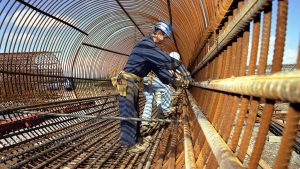The Ontario Construction Secretariat (OCS) recently polled 200 general and trade contractors in the province’s ICI sector on the impact of the coronavirus on their business.
Some of the findings were startling.
About half of the contractors indicated that most or all of their work had stopped.
“That’s pretty substantial,” Katherine Jacobs, director of research at the OCS, told the Daily Commercial News recently.
The poll was done after the provincial government shut down construction deemed non-essential in early April, but Jacobs says the OCS still didn’t anticipate so many businesses facing trouble.
Also concerning from the poll is that contractors saw revenues drop by 42 per cent from this time last year and more than half of the contractors expected they would need government assistance to get by.
“We knew it (COVID-19) impacted them but the depth of it was a little surprising for me,” she adds.
Jacobs says a positive takeaway from the poll was that the contractors’ top concern, “over and above losing money or going out of business,” was the health and safety of their workers.
“And they took significant actions to deal with that,” she says.
For example, a number of contractors have improved sanitation standards by updating washroom facilities and are paying close attention to cleanliness throughout their construction sites.
“It’s a big positive and something we will explore in further ways,” Jacobs explains.
“Going forward is this (sanitation) going to be a permanent change in the industry?”
She points out the building trades have had discussions with various provincial ministries to help address safety and sanitation issues on worksites with both contractors and subcontractors.
Other prominent concerns for contractors polled were fears of a global recession, workforce productivity, supply chain disruptions, business solvency and meeting contractual deadlines.
Of the 200 contractors surveyed, 64 per cent indicated their work had stopped and 65 per cent expected coming work delays. Another 63 per cent saw a medium to high impact on supply chains.
About three-quarters of the contractors laid off construction site workers, while 42 per cent laid off office staff, according to the poll.
More than half of the 200 firms had applied for government assistance and 30 per cent had taken out loans as a result of the coronavirus economic disruption, the findings concluded, she says.
While 16 per cent of construction firms expected they would go out of business within three months if things didn’t improve, another 28 per cent feared losing their businesses within three to six months if government restrictions on construction remained in place.
The poll was done prior to the province’s announcement to allow some businesses, including some construction companies, to reopen in early May, says Jacobs.
She states 63 per cent of the contractors agreed with the province’s decision to initially shut down parts of the construction industry in April; only 22 per cent disagreed.
Asked about the most common actions to lower risk of the virus’s spread on worksites, 88 per cent of the contractors indicated a need for more frequent hand washing. Other priorities were more hand sanitizer and hand-washing stations on worksites and the establishment of complaint procedures for workers concerned about unsanitary conditions.
Jacobs says the OCS might do additional “waves” of the survey.
“We are hopeful that it provides information to our stakeholders which they can either use if they lobby government or to benchmark how they are doing with respect to their colleagues and other businesses,” she says.
The secretariat does an annual survey published in March which polls 500 ICI contractors across the province on the state of the economy.











Recent Comments
comments for this post are closed